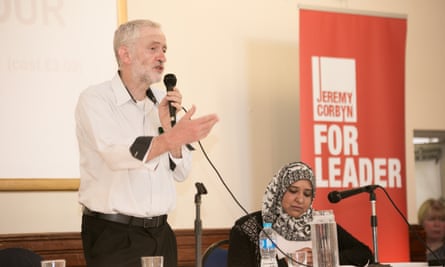The author of the economic plan set out by Labour leadership contender Jeremy Corbyn has defended “Corbynomics” in the face of an attack by the shadow chancellor, Chris Leslie.
Richard Murphy, the fair tax expert recruited by Corbyn to draft his economic policy, deepened divisions on the left by saying “Leslie has got this completely wrong.”
In an interview on BBC Radio 4’s Today programme, Leslie singled out Corbyn’s plans for a people’s quantitative easing, which he derided as printing money to “magically deal with all the public service and public investment needs that we have”.
He added: “The difficulty is that if that then provokes higher inflation, if that then means that interest rates go up, who will pay the price for that? It is the poorest and those on the lowest incomes who already find the cost of living very difficult.”
Murphy, author of The Courageous State, an acclaimed critique of neoliberal economics, responded by attacking the Labour government’s bailout of the banks.
Speaking on BBC Radio 4’s World at One, he said: “[Leslie] should remember that it was a Labour government that in 2009 created a programme of QE that eventually printed £375bn to bail out the banks. It didn’t work. It simply boosted bank bonuses and bank profits and ordinary people didn’t benefit.”

He added: “People’s QE is fundamentally different. [It] does have the Bank of England print new money, which is identical to the process that is use by ordinary banks when they lend to business, but it gives that money to people like housing authorities, to local councils, to a green investment bank to build houses, to schools to build hospitals. The very things Chris Leslie says would not be possible if this programme was put into place.”
Challenged on Leslie’s point about high inflation, Murphy said: “Any system of people’s QE would be turned off if we got to a situation of high wages and full employment, but we are so far from that at the moment that we have to tackle the low-wage economy and the lack of productivity in the UK by creating new investment, which is the foundation for new prosperity.”
“This programme is about creating jobs in every single constituency in the UK. It is not costless, there will be a small rise in inflation, but we need it. It would have to be used responsibly, but of course Jeremy Corbyn understands that.”
Murphy added: “Given the economic situation we face where hundreds of thousands of people are underpaid and aren’t paying tax because they don’t earn enough to do so … The real question for Chris Leslie is why did you support £375bn for the banks when actually very much less would create jobs in every constituency throughout the UK, which is precisely what Jeremy Corbyn is offering by adopting this programme.”
Earlier Murphy also defended Corbyn plans to the blog LondonlovesBusiness. He said: “Jeremy Corbyn wants to create a level playing field for business by stopping those who are tax-cheating to make sure that all those who are honest, upon whom we depend, have the chance to prosper without being undermined by the cheating companies and people who exist in our economy …
“This is not an anti-wealth programme: it is a spreading the wealth more widely programme when current tax and social structures do not deliver that. Everyone, barring banks that specialise in speculation, would be better off as a result. And the chance of another crisis would be greatly reduced. This is the economics of responsibility as well as the economics of wellbeing.”

Comments (…)
Sign in or create your Guardian account to join the discussion